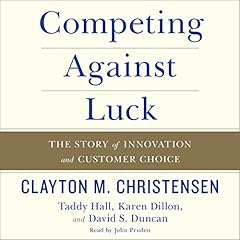
The Nature of Technology
What It Is and How It Evolves
No se pudo agregar al carrito
Add to Cart failed.
Error al Agregar a Lista de Deseos.
Error al eliminar de la lista de deseos.
Error al añadir a tu biblioteca
Error al seguir el podcast
Error al dejar de seguir el podcast
 Exclusivo para miembros Prime: ¿Nuevo en Audible? Obtén 2 audiolibros gratis con tu prueba.
Exclusivo para miembros Prime: ¿Nuevo en Audible? Obtén 2 audiolibros gratis con tu prueba.Compra ahora por $19.52
-
Narrado por:
-
Victor Bevine
-
De:
-
W. Brian Arthur
The Nature of Technology is an elegant and powerful theory of technology's origins and evolution. It achieves for the progress of technology what Thomas Kuhn's The Structure of Scientific Revolutions did for scientific progress. Arthur explains how transformative new technologies arise and how innovation really works.
Conventional thinking ascribes the invention of technologies to "thinking outside the box", or vaguely to genius or creativity, but Arthur shows that such explanations are inadequate. Rather, technologies are put together from pieces - themselves technologies - that already exist. Technologies therefore share common ancestries and combine, morph, and combine again to create further technologies. Technology evolves much as a coral reef builds itself from activities of small organisms -- it creates itself from itself; all technologies are descended from earlier technologies.
Drawing on a wealth of examples, from historical inventions to the high-tech wonders of today, and writing in wonderfully engaging and clear prose, Arthur takes us on a mind-opening journey that will change the way we think about technology and how it structures our lives.
©2009 W. Brian Arthur (P)2009 Audible, Inc.Los oyentes también disfrutaron:




















Reseñas de la Crítica
"We launched Java based on Brian Arthur's ideas." (Eric Schmidt, CEO of Google)
Las personas que vieron esto también vieron:

The narration was notable for being not very notable.
Thought-provoking
Se ha producido un error. Vuelve a intentarlo dentro de unos minutos.
Needs to have some meat on the bone.
What’s the point
Se ha producido un error. Vuelve a intentarlo dentro de unos minutos.
mind blowing
Se ha producido un error. Vuelve a intentarlo dentro de unos minutos.
The Nature of Technology (TNOT) was a fascinating read that deftly explains how new technologies come to be. While there's no great aha-moment that opens up some new novel way of thinking about technology, it does adequately explain how technological developments emerge.
Through a very narrow lens you can call it evolutionary, perhaps the same way a chef mixing two heretofore uncombined ingredients that create a delicious new dish is evolutionary. But in the broader Darwinian sense, what's posited in TNOT is not evolutionary. Genetic mutations that Darwin wrote about were needed for the species to survive. The same theory was further explained by Richards Dawkins' spectacular The Selfish Gene.
The modern day technological developments described in TNOT did not arise out of necessity so much as out of convenience (and logic) -- that is, combining multiple existing technologies to create something novel and new.
The five stars were for how thorough his analysis was. I still think it's worth the credit.
Love Brian Arthur & thesis but theory not perfect
Se ha producido un error. Vuelve a intentarlo dentro de unos minutos.
And also, most of the arguments represent author’s passion or meditation more than the fruit of his long career as a distinguished researcher.
Pretty good- not as good as it was hyped
Se ha producido un error. Vuelve a intentarlo dentro de unos minutos.


